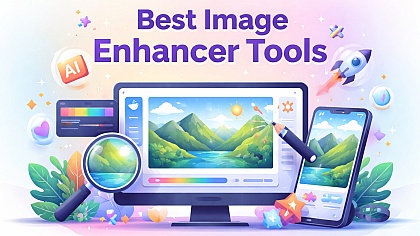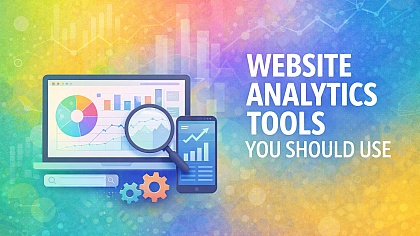How AI Visibility Tracking Tools Improve SEO & Marketing
Visibility is all in the competitive digital space. Brands spend a lot of money on SEO and digital marketing campaigns to make sure that their content is ranked higher to reach the right audience and to motivate meaningful engagement. Nevertheless, these efforts have never been measured and optimized successfully.
Old tracking systems can be very uninformative, with the primary data being on the ranking of keywords and traffic. The trend of companies shifting to more sophisticated technologies today is toward visibility tracking tools powered by AI.
These are not only metrics tracking tools; they assist marketers in making smarter data-focused decisions, which make a significant difference in SEO and overall digital marketing performance.
The importance of Visibility in Digital Marketing.
Digital visibility establishes the ease with which a brand may be located online. Unless your site features in search engine results when people query your relevant keywords, then you are virtually unknown to the prospective customer base. Google does millions of searches every day, and even the tiniest increase in visibility can have a significant effect on the amount of traffic to the site, brand recognition, and earnings.
Visibility is not merely rankings in the eyes of the SEO professionals. It is being aware of how the content is performing in each platform, what is being consumed, and what competitors are strategizing. Manually or using old tools, it is not efficient to track such factors, particularly in the modern, rapidly changing algorithms and user behavior. This is where AI steps in.
The Drawback of Conventional Tracking Systems.
Traditional visibility measurement tools quantify generic measures such as ranking of the keywords, impressions, clicks, and linkages. These measures, though effective, tend to miss the bigger picture. For instance:
- Lack of Context: Conventional tools can inform you that a page is ranking, but not why it is ranking and why its performance has abruptly declined.
- Late Insights: Not all details are real-time, which means a delay in reacting to the issue of SEO.
- Surface-Level Analytics: These tools do not take into consideration changing search intent, semantic keywords, or user behavior patterns.
This has led to marketers having disjointed information, which cannot easily be converted into practical action plans.
AI improves Visibility Tracking.
Artificial Intelligence has revolutionized how digital marketers track the performance and optimize their activities. An AI visibility tracking tool is more than old-fashioned analytics, as it comprises machine learning, predictive modeling, and natural language processing. This allows them not only to report on performance but also to gain more insight into consumer behavior and search engine algorithms. This is how AI can be used to change things:
- Real-Time Insights: AI can analyze big data in real-time and provide marketers with real-time reporting on performance.
- Predictive Analytics: AI can be used to predict future trends based on historic patterns, and brands can plan content strategies.
- Contextual Understanding: AI does not simply depend on keywords but also considers semantic relevance, user intent, and engagement indicators.
- Automated Recommendations: These tools recommend particular tasks like content optimization, link building, or campaign optimization.
Advantages of AI Visibility Tracking in SEO

-
Better Keyword Strategies.
AI is smarter at analyzing search queries, detecting long-tail keywords, and semantic keywords that meet changing search intent. This not only optimizes content in terms of rankings, but also relevance.
-
Increased Performing Content.
Through AI, marketers are able to quantify the relationship between content and user, starting with engagement metrics, up to dwell time. This assists in optimizing content to make the most conversions.
-
More Intelligent Competitor Analysis.
An artificial intelligence visibility monitoring system does not simply provide you with the image of the competitors, but it only indicates their strengths, weaknesses, and the areas you can capitalize on. This is more focused on strategy-building.
-
Faster Problem Detection
The AI systems recognize runaway traffic, visibility, or keyword performance in real time. Marketers do not need to wait until monthly reports are obtained, and do not have to wait to take action and rectify the problem.
-
Multi-Channel Insights
AI is not limited to search engines. It also monitors presence on platforms such as social media, video channels, and marketplaces that provide a single perspective of online presence.
Implications on Digital Marketing Performance
The incorporation of AI in the visibility tracking does not solely enhance SEO but also boosts the wider digital marketing. Here’s how:
- Increased ROI: Marketers are able to spend their budgets more effectively by determining which campaigns have the greatest impact.
- One-to-One Marketing: AI will enable companies to divide the audience and build campaigns that resonate best with individuals.
- A Rapid New Insight: Faster campaign changes are boosted by automated insights that eliminate the need to depend on manual analysis.
The use of an AI visibility tracking solution is transforming the manner in which companies quantify and optimize their presence online. They offer real-time, contextual, and predictive information that is way beyond surface-level metrics in comparison to traditional approaches.
These tools can greatly improve the performance of content and keywords, as well as benchmarking competitors, which greatly boost the outcome of SEO and digital marketing. The use of AI-driven visibility solutions has become a necessity rather than an option for companies that want to remain competitive in a digital world.














